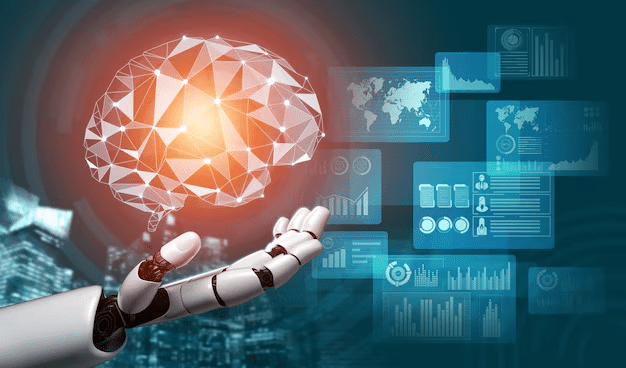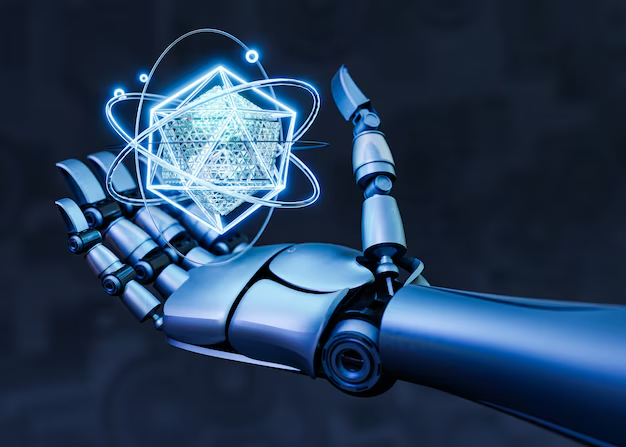Artificial Intelligence (AI) is one of the most transformative forces in modern technology, reshaping industries, driving innovation, and revolutionizing how businesses and societies operate. With its capacity to mimic human intelligence, process vast amounts of data, and learn from experience, AI is making profound impacts across various sectors, from healthcare and finance to entertainment and education. In this article, we’ll explore how AI is changing the world of technology and what the future holds for its continued evolution.
1. Enhancing Automation and Efficiency

AI is at the forefront of automation, making processes more efficient and reducing the need for human intervention in repetitive tasks. In industries such as manufacturing, logistics, and customer service, AI-driven robots and systems can perform tasks with speed, precision, and consistency that human workers cannot match. For example, in manufacturing, AI-powered robots handle assembly lines, monitor equipment, and optimize production schedules. In the customer service industry, AI chatbots can respond to queries, troubleshoot issues, and even resolve complaints, improving customer satisfaction and cutting operational costs.
Benefits:
- Reduces labor costs and errors.
- Increases production speed and quality.
- Enhances overall operational efficiency.
2. Transforming Healthcare and Medicine
AI has made groundbreaking strides in the healthcare sector, particularly in diagnostics, personalized medicine, and drug discovery. By analyzing vast datasets, AI can assist doctors in diagnosing diseases more accurately and quickly. For example, AI algorithms are used to analyze medical imaging such as X-rays, MRIs, and CT scans, identifying conditions like tumors or fractures with high precision. Additionally, AI is instrumental in personalized treatment plans, using patient data to recommend the most effective treatments tailored to individual needs.
Examples:
- AI in radiology helps detect diseases earlier.
- AI in drug discovery accelerates the development of new medications.
- AI-driven health apps provide real-time monitoring and insights into patients’ conditions.
3. Driving Innovation in Artificial Intelligence and Machine Learning
Artificial Intelligence itself is the product of machine learning (ML), a subset of AI where systems learn from data and improve over time. The continuous advancements in machine learning are pushing the boundaries of what AI can achieve. From deep learning, which mimics the human brain’s neural networks, to reinforcement learning, which allows systems to learn through trial and error, AI is becoming more intelligent and capable of tackling increasingly complex problems. These innovations have led to AI breakthroughs in areas such as voice recognition, natural language processing, and predictive analytics.
Impact on Technology:
- AI enables virtual assistants (e.g., Siri, Alexa) to understand and respond to voice commands with increasing accuracy.
- Self-driving cars use machine learning algorithms to improve navigation and safety.
- AI-powered recommendation systems, like those used by Netflix or Amazon, personalize content and product suggestions for users.
4. Revolutionizing Data Analysis and Decision-Making
AI is also reshaping how businesses analyze data and make decisions. Traditionally, data analysis required human intervention and was time-consuming, but AI tools can sift through large datasets in seconds, identifying trends, patterns, and insights that may have been overlooked by humans. With predictive analytics, AI can help companies forecast demand, optimize pricing strategies, and even detect fraud. In finance, AI-driven algorithms are used to analyze market trends, manage risks, and automate trading, making decision-making more data-driven and accurate.
Applications:
- AI in marketing helps businesses target the right customers with personalized ads.
- Financial institutions use AI to assess credit risk, detect fraudulent activity, and automate trading.
- Retailers use AI to predict consumer behavior and manage supply chain operations.
5. Enhancing Customer Experience with Personalization
AI has significantly improved the customer experience by offering personalized services and products. By analyzing customer behavior and preferences, AI can provide tailored recommendations, whether it’s in the form of products, music playlists, or news feeds. Virtual assistants powered by AI can provide real-time assistance, improving customer service without human agents. Companies use AI to improve user experiences on websites, apps, and social media by adapting content and interactions based on user preferences.
Examples:
- AI-powered recommendation engines on e-commerce platforms like Amazon and Netflix.
- Personalized marketing campaigns using AI-driven insights.
- AI chatbots that provide 24/7 customer support, improving response times and user satisfaction.
6. Advancing Cybersecurity
With the increase in cyber threats, AI is becoming a crucial tool in the fight against cybercrime. AI-powered security systems can detect anomalies in network traffic, identify potential vulnerabilities, and prevent data breaches by responding faster than traditional security systems. Machine learning algorithms can analyze patterns of attack and learn to recognize new, emerging threats. Additionally, AI can be used in biometric authentication, such as facial recognition or voice verification, enhancing security measures.
Benefits:
- AI identifies and mitigates potential security risks in real time.
- Enhances the accuracy of threat detection and prevention systems.
- Enables quicker responses to cyberattacks, minimizing damage.
7. Facilitating Innovation in Autonomous Vehicles
AI is a driving force behind the development of autonomous vehicles, transforming transportation. Self-driving cars and trucks use AI systems to interpret data from sensors, cameras, and GPS to make decisions in real time. This technology has the potential to reduce accidents, optimize traffic flow, and transform logistics and supply chains. Companies like Tesla, Waymo, and Uber are already deploying AI in autonomous vehicles, revolutionizing the way we think about transportation.
Potential Impact:
- Reduced road accidents and fatalities due to AI-powered safety systems.
- Improved traffic flow and decreased congestion in cities.
- Revolutionized logistics with autonomous trucks and delivery systems.
8. Ethical Considerations and Challenges
While AI brings numerous benefits, it also presents ethical challenges. Issues such as bias in AI algorithms, data privacy concerns, and the displacement of jobs due to automation are significant considerations. AI systems learn from existing data, and if that data reflects human biases, the AI can perpetuate or even amplify these biases. Moreover, as AI automates more tasks, there is a growing concern about job loss and the need for upskilling the workforce to adapt to new roles.
Ethical Challenges:
- AI systems may unintentionally reinforce societal biases (e.g., racial, gender bias).
- The use of personal data in AI-driven applications raises privacy concerns.
- Automation may lead to job displacement, requiring workforce retraining and adaptation.
Conclusion
Artificial Intelligence is no longer a futuristic concept; it is actively shaping the world of technology and has already begun transforming industries and societies. From enhancing automation and efficiency to enabling breakthroughs in healthcare, AI is driving progress across sectors. However, with the tremendous benefits AI offers, there are also challenges related to ethics, security, and job displacement that must be addressed.
As AI continues to evolve, it will play an increasingly integral role in shaping the future of technology, business, and everyday life. By leveraging AI responsibly and ethically, we can unlock its full potential while mitigating its risks, creating a future that is both innovative and inclusive.
FAQs
How is AI changing the technology industry?
AI is transforming the technology industry by enhancing automation, improving data analysis, enabling machine learning advancements, and optimizing customer experiences. It is driving innovation in sectors like healthcare, finance, manufacturing, and cybersecurity.
What are the biggest challenges of AI?
The main challenges of AI include ethical issues such as algorithmic bias, privacy concerns, job displacement due to automation, and the need for proper regulation and oversight to ensure AI is used responsibly.
Can AI replace human jobs?
AI has the potential to automate many tasks, which may lead to job displacement in certain sectors. However, it also creates new opportunities for jobs in areas such as AI development, data analysis, and machine learning. The key is for workers to upskill and adapt to changing job roles.
How does AI improve customer service?
AI improves customer service through automation tools like chatbots and virtual assistants, which provide 24/7 support, personalize interactions, and quickly address customer queries. It can also help predict customer needs and preferences, enhancing overall satisfaction.
Is AI secure?
AI can enhance cybersecurity by identifying threats faster and automating responses. However, AI systems can also be vulnerable to attacks if not properly secured, making it essential for businesses to implement robust security measures to protect AI applications.


